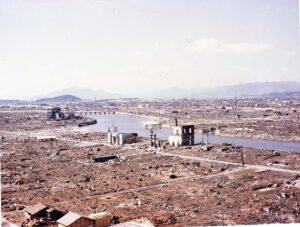The Syrian Kurd blinded because he’d seen too much
From the man literally blinded by horrors to the girl whose dream is to read books, we meet the Syrian Kurds fleeing the ISIS onslaught on Kobani.
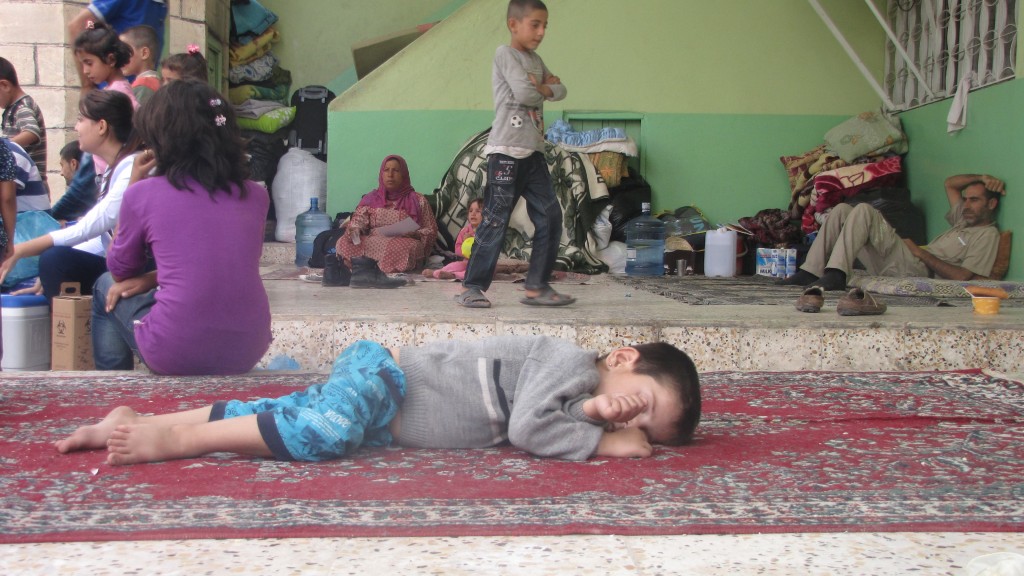
Tuesday 7 October 2014
During the day, the hill on the Turkish-Syrian border had been as desolately sandy as its surroundings. The night's downpour had turned it into a pile of muddy goo. As I approached the border fence, a crowd of Kurdish men was observing the battle between the Kurdish defenders of Kobani and the Islamic State (ISIS) fighters. The Islamic State militia units were attacking backed by heavy artillery. The Kurds were responding with automatic-rifle fire and an occasional home-made rocket.
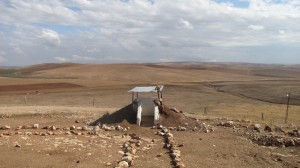
Some soldiers of the Turkish army were also observing the action taking place on the Syrian side of the border. They were mostly doing it from the safety of their armoured vehicles ‒ which seemed like a good idea, since there weren't all that many of them around. Their mood was one of wary apathy. As the battle grew in scope and ferocity, one could see some hundred Kurdish refugees lined up along the barbed wire separating the two countries. It was heartwrenchingly obvious they were hoping the Turks might still let them in. As things stood, they were caught in the crossfire.
Yet another haunting image from this desperate struggle, yet another reminder of the savagery of Syria's civil war. As I watched, the whole bloody mess seemed so wretchedly complex that any solution granting safety to the civilian population seemed all but foredoomed.
A brief respite
Along with fourteen relatives, Omar Issa, 67, reached Turkey about a week ago. His pitiful expedition, hailing from the border-town of Karacha, has pitched a tent on an open field crossed by a muddy creek.
The tent provides a modicum of protection for no less than 18 families. Less than a kilometre to the west, a vicious firefight between the Kurds and the ISIS militiamen was raging on. Ignoring the explosions, the children were merrily frolicking around the creek. The women were catching up on the laundry, while the older men – pretty much everyone who could fight remained back in Syria – were sitting on plastic chairs, smoking and drinking tea. There seemed to be no end to the political debates.
“As soon as the Islamic State was formed in Syria, I knew that sooner or later they would be coming for us, the Kurds!” Omar told me. “To them, we are worth less than animals. We had to run, you understand? They'd already taken over all the neighbouring villages. Can you imagine our horror? So we packed what we could and drove here, to the border.”
“Then it took them two whole days to let us pass, the Turks,” he recalls. “Yes, we do feel safe here. But the housing situation is horrible, just horrible. It's cold and it's wet, and the winter is approaching fast – all of us can feel it.”
I spent quite a long time speaking with this traditionally dressed Kurdish elder, who only a few weeks ago used to grow olives and tend his flock. During our conversation, Omar revealed that two of his sons had stayed home to fight. He expressed great concern that the city of Kobani was about to fall. In his opinion, it would mean a great disaster for the Kurds and many others beside. “Under Bashar al Assad's regime, we were safe, but we had no freedom,” he mused softly. “It was very very hard for us. And now… Well, now we are free men, but we are trembling for our lives.”
The consensus among the refugees seemed to be that they were entirely dependent on the help of their relatives on the Turkish side of the border. “They have helped us a great deal, and we are very grateful to them,” said one of those who had taken flight across the border. “But it is obvious we will not be able to hold out for much longer. We left everything behind. We are now left entirely at the mercy of the international community. There is, of course, no lack of promises; but we are now desperate for some actual assistance.”
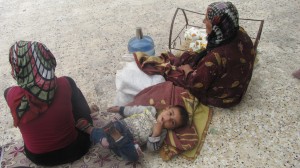
The majority of the Kurds that did manage to cross the border took refuge in nearby Suruc. With every day, the situation there grew more volatile. The people in the streets were visibly exhausted, some were openly raging at the sheer monstrous inhumanity of their predicament. Only a few kilometres away, their loved ones were being massacred, and they were powerless to help. Yet some also admitted it was little wonder Turkey had decided to close the border. After all, over the last fortnight the population of the filthy, down-trodden town of Suruc has more than doubled.
No-one really knew the exact number of the inflowing Kurdish refugees. All available housing was bulging at the seams, and many of the refugees were left with no recourse but to sleep in parks and darkened underpasses. Quite a number of them have pitched improvised tents in the surrounding fields. All of them were left entirely to their own devices and whatever help the locals were able to supply. At the time of my arrival, precious little actual humanitarian relief had managed to reach Suruc, a town that was visibly tottering on the brink of a nervous breakdown.
“The ISIS men were sure to kidnap us and sell us into slavery”
Naima Khalil, 19, introduced herself to me as a Syrian Kurd from Kobani. In the chaos that had become her existence there by the Syrian-Turkish border, she longed for the safety and stability provided by her school and a small collection of books she had to leave behind.
Accompanied by her mother, father, brother and five sisters, she fled eight days ago. The ISIS militiamen have been tightening their grip on this thoroughly besieged city, until Naima's father decided they could no longer run the risk of staying put. The father was all too aware what happened to many others who failed to flee the Sunni extremist elsewhere.
“Our father was afraid for us, women,” Naima explained with a diffident shrug. “The ISIS men were sure to kidnap us and sell us into slavery. It's what happened to so many girls in Syria and Iraq. So what could we do? We gathered what we could and ran for our lives. You know, there's been no electricity or running water in Kobani for a while now. We suffered there for three years. We had to dig our own well. But we knew that in the surrounding villages, things were even worse.”
This swarthy nineteen-year-old, Naima, was talking to me in commendably fluent English. Back in Syria, she and her family have managed to survive three years of constant war. It wasn't always the case, but in Kobani, the Kurds had opted to join the Syrian revolution. During the first months of the insurgency against the Assad regime, a few peaceful demonstrations took place in Kobani. The government forces arrested a number of people, but for some reason they didn't bring their heel down as brutally as they did in Homs or Da'ara. The summer of 2012 saw a “tactical” retreat of Assad's forces from the Kurdish territories. The Kurds wasted little time in forming their own local authorities and setting up their own dedicated, if rather tiny, army. They declared an autonomous Kurdish zone and decided to name it Rojave.
For Naima, this meant the end of her schooling. It also meant an end to her hope of going on to study medicine – something she'd dreamt about throughout her entire childhood. The road to Aleppo, where the university is situated and where she was meant to take her entrance exams, became “impassable”. In reality, this means the road became one of the focal points for the clashes between the various insurgent groups, the government forces, the Kurds and the burgeoning ISIS.
There is no getting around the fact that the situation is mercilessly complex. The sudden rise of the ISIS's fierce, hate-crazed militiamen can be defined as the illegitimate offspring of decades of American foreign policies, Saudi funding and the Turkish fear of the Kurds getting organised. The Islamic State fighters first decisively destroyed the Syrian insurgency against the Assad regime, then they crossed the Iraqi border to establish what they call a “caliphate”. After that, they wasted little time to get on with their business of rooting out all dissent to their militant creed. After the Yaezidis, the Kurds were next in line. Over the course of the last two weeks, over a hundred Kurdish villages were taken by the militiamen. Some 130,000 Kurds were forced to flee to Turkey via the nearby border, which was proving increasingly porous. With every passing day, the chaos only intensified.
Naima Khalil is just one of the countless innocent souls caught up in the lunacy. “I am angry and I am sad,” she admitted. “The Turkish children here are set on frightening me by telling me the Islamists are coming here to murder me, while the grown men want only to humiliate me. Most days, I can barely gather the courage to step out of the house where we live along with three other families.”
And how did Naima manage to find this accommodation? “Oh, one of my father's acquaintances sort of lent it to us for 10 days. The bad news is that the day after tomorrow we have to leave, and then we'll be left to the streets. We simply don't know what to do. There's no money left. My parents spent what little we had on getting us out of there alive. Perhaps… Perhaps we'll be forced to go to Istanbul. To live on the streets. I'll start looking for work as soon as we get there.”
“There is nothing I want more than to go back to school, but I guess that's not going to happen, huh,” she added, before breaking down into heavy sobs. Then Naima summoned what courage and optimism she had left and asked me if I had a book in English. “Anything, anything at all,” she pleaded. As far back as she could remember, all she really wanted to do was read. “My father, he wants me to grab any chance at education life gives me. Even when I was not able to go to school, I studied all the time ‒ I studied at home, where else?” she described. “I read everything I could get my hands on. I don't want to be like most of my friends: their parents married them off to make sure they were safe but losing them their freedom in the bargain. I simply couldn't do that. Not for all the safety in the world. After all, my mother Najaf has always been a fierce advocate of women's rights.”
This last bit allowed Naima to regain some measure of composure and even pride. As we talked, we stood amid a vast crowd of Kurdish refugees who'd gathered here for the lentil soup. This brackish-looking concoction was being distributed by Turkish humanitarian workers from titanic aluminium vats. In this dusty, anxiety-ravaged town of Suruc, Naima told me, she felt more trapped than anywhere before. “These local men, they are staring at me, and they are staring and staring, and I am always looking away… And every day, I get more afraid of them, of what they might do to me. You know, this… This is not my world. This should not be my world.”
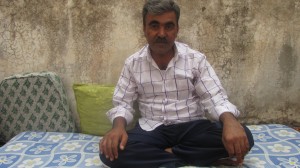
Mohammed Chechu, a Kurdish refugee from a village near Kobani, lost his sight some 18 months ago. He claims it was because he had seen too much horror. Along with his family, he left Syria for the border town of 12 twelve days ago. His village – just like all the other Kurdish villages in the region – was taken over by the Islamic State.
“Since I can't see, I hardly ever left the house. One day, I heard shouting in the streets. People were very frightened. They were telling each other that in the neighbouring villages, the Islamists were slitting throats and rounding up the women to sell them into slavery,” he recounted. “My greatest fear was that my blindness would make me a burden for everyone. I was determined to stay in the house, come what may, but my family convinced me to help them gather a few things and flee. We had to leave behind everything we worked for so hard. Our house, our car, our animals, our life.”
I spoke to Mohammed inside a mosque, where at least 300 Kurdish refugees have been crammed together for the past fortnight. He told me that it took his family two whole days to make the trip. They spent a night at the Turkish border, then the Turkish soldiers decided to let them pass.
Many of Mohammed's relatives stayed back in Kobani: cousins, nephews, even many of his friends who have never before as much as lifted a walking stick in anger, let alone a Kalashnikov rifle. But they knew enough to know their fate was entirely in their own hands. No help has yet been given to them, and they have learned to expect none. The coalition was mostly bombing oil refineries – its priorities couldn't be more clear. Meanwhile, the Kurds were perishing by the thousands, and hardly for the first time. Given the long brutal history of this proud, self-reliant people, it is no wonder so few of its members are willing to place any trust in the international community. The vast majority claim they would much prefer to die valiantly in battle. But perhaps their greatest problem is that, at this crucial moment in history, there is precious little unity between the 25 million Kurds of the Middle East, let alone a focused political agenda. So far, none of their brothers have come to the aid of the Syrian Kurds in the Kobani province. They have their own battles to fight.
“It's hard. The worst part is that my blindness prevents me from taking care of my family,” Mohammed went on. “Instead, they have to take care of me! I'm completely useless. Like myself, my wife also used to be a teacher in our school. But as soon as I lost my sight, she had to drop all that and devote herself fully to the needs of our family.”
Mohammed's unseeing eyes have honed other forms of sight and insight. “For this past week, all I've done is sit around and listen to people talk. I also smoke a lot and think, think, think. I may be blind, but that doesn't mean I can't see the human pain and suffering all around me. So many people are forced to sleep in the streets. We are so cold – but there is no help in sight. Winter's coming, and things are only going to get worse. I'm afraid that there will come a point when they will simply decide to trample us into the ground… I'm very grateful to Turkey for letting us in, but now someone else should step in and help, too!«
In this most unfortunate exile, Mohammed is accompanied by three sons and a daughter. The youngest of his sons is 12 and has recently been diagnosed with a very serious type of diabetes. “No medicine is available for him here. And we also have no money for the treatment. I know he got sick because of me. And because of the war.” Throughout our conversation, Mohammed fought valiantly to keep his emotions in check, but this is where he lost control, and tears came pouring out of his dark, sightless eyes.
“I want to teach again.”
The last time Mohammed stepped in front of a class was two years ago, when the government forces temporarily left the Kurdish areas, which enabled the Kurds to organise their own schools. Even then, his eyesight was starting to fail. He is convinced that the stress was the main cause. He had seen so many atrocities, perpetrated both by the regime and then the various Islamic militias that started to brutalise his homelands. The viciousness kept mounting and mounting, much like the war itself. Mohammed finally went blind about a year and a half ago.
“For a while, all I could see were shadows, and then not even that,” he recalls. “It was… It was like a sort of death. But I didn't lose hope. After a few weeks, I regained at least some of my spirit and convinced myself that there will come a day when I would see again, and then I could once more step into a classroom of happy children, all of them willing to learn.”
But one needs considerable foresight to see that distant day through the heavy fog of conflict. “You know, Syria is now seeing a generation of children who had to leave school altogether – an uneducated, traumatised generation… It is the worst thing that could have happened.” From the quiet, plaintive way he spoke, it was clear that Mohammed still hadn't come to grips with all the horrors that recently befell him and his people. But in spite of his blindness, his deep dark eyes kept staring right at mine, and I was startled to note that at times those poor sightless eyes were still sparkling – and with, of all things, hope.
Almost the entire territory of Syria has been ravaged by war, and the roads connecting the major urban centres have been the most dangerous parts of this fallen country… Nevertheless, a few months ago, Mohammed's wife still decided to gather the last of their savings and take her husband to a renowned neurologist in Damascus. One day, she simply started the car and set off toward the capital. At every checkpoint, they were stopped and questioned, and the surly men with machine-guns often made very explicit threats to boot. They were stopped by the government troops, the ISIS militiamen, the members of the Free Syrian Army and a number of unidentifiable ruffians, all of these warlords the new rulers of the divided state. All in all, it took them thirty-six hours to reach Damascus. They spent the night in their car, in the middle of the desert.
“My wife was able to get some sleep. I didn't. I was much too terrified,” Mohammed said of the nerve-wracking journey. “All the time, I was listening to the various noises, wondering what each of them meant. A few times, panic almost had me by the throat. But I was also looking forward to seeing the specialist. I was really hopeful that he could help me.”
Hope remains
When they arrived, the neurologists saw Mohammed straight away. He examined his eyes very assiduously, and to the patient's great surprise he declared there was nothing wrong with them. The problem is of a purely neurological nature, that much is now certain. According to the specialist, the blindness was caused by some elaborate glitch of the nerves in Mohammed's brain. The patient found himself much heartened by the news, since the neurologist openly told him that there was an excellent chance of him regaining his sight if proper treatment could be secured.
“The return trip may have been just as dangerous as the drive to Damascus. But this time around, I was warm all over with a feeling not unlike happiness,” Mohammed remembered. “The very mention of the possibility that I might see again cheered me up no end. On my return, I was a different man, full of hope.” But this hope lies at some considerable distance in space, time and opportunity. “The [doctor] from Damascus told me that a certain clinic in Spain specialises in the exact form of dysfunction I was diagnosed with having! But he didn't tell me its name or location, and in all the excitement I forgot to ask. I'm glad to say that I have a relative in Spain, who promised he would help me find this clinic… But I have no idea how I'm going to get there. I have neither the funds nor the necessary papers.”
Mohammed Chechu also sent the results of his examination to a Palestinian doctor in Jordan. He is still waiting for the reply. But these last few weeks, his eyes have regained a small semblance of their former function. He cannot exactly see anything, but he can sometimes “feel” movement in front of his eyes, he says – and now and then he finds himself sensing a shift in the quality of the light. If he places his palm directly in front of his eyes, he can sometimes convince himself that he can discern a few of its features. But if an object is placed more than 10cm away, he cannot see it at all. “All the time I hope and pray. I want to be a man again, someone who can take care of his family, my poor beloved wife and children, who had been so traumatised by this senseless war,” he expresses his yearning. “In my opinion, only someone who is able to serve others can fully appreciate the marvel of what it means to be human.”
Mohammed ends our conversation by apologising for being so “selfish”. “I do apologise for going on like this, for focusing almost entirely on my own problems. This unspeakable tragedy, well… The truth is we're all in it together, and our pain is only growing worse. Please help us.”
____
Follow Boštjan Videmšek on Twitter: @bosthi
His website is: bostjanvidemsek.com

